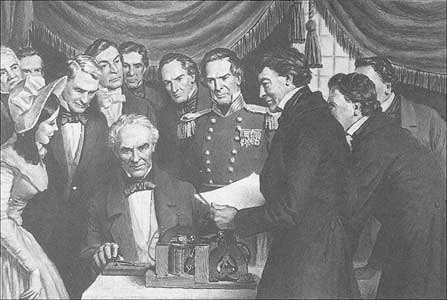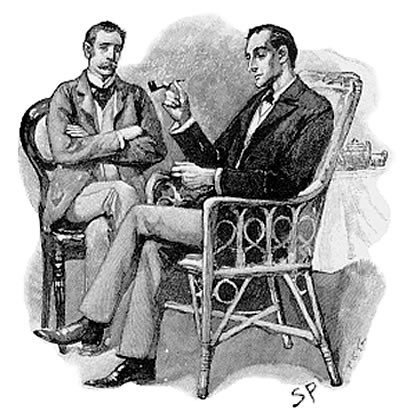While the television show The Soup brings you “the strange, obscure and totally unbelievable moments in pop culture, celebrity news and reality TV,” Word Soup brings you those strange, obscure, unbelievable (and sometimes NSFW) words from talk shows, sitcoms, dramas, and just about anything else on TV.
Aegishjalmur
Hank: “What the hell is that thing on his face?”
Nick: “It’s called the Aegishjalmur, the helm of awe. It’s a symbol the Vikings wore for invincibility.”
“The Woman in Black,” Grimm, May 18, 2012
Aegishjalmur may translate literally as “terror helm.”
beefsquatch
Linda: “He’s just mad because he thinks Gene beefsquatched all over his special moment.”
Bob: “Don’t use that as a verb.”
“Beefsquatch,” Bob’s Burgers, May 20, 2012
The Beefsquatch is a character that Gene developed for his father’s television cooking segment, in which he dons an ape mask and gorges himself on hamburgers. Beefsquatch is a blend of beef and Sasquatch, another name for Bigfoot, which comes from Halkomelem, “a native language of the Pacific Northwest.” To beefsquatch means to ruin something, perhaps reminiscent of squash or quash.
copera
Cop: “Love is not admissible evidence! I’m working on a cop opera.”
Everyone: “Copera!”
Pierce: “Policial!”
“First Chang Dynasty,” Community, May 17, 2012
Copera is a blend of cop and opera. Cop originated in 1704 as a northern British dialectecal meaning “to seize, to catch,” which may have ultimately come from the Latin capere, “to take.” Policial is a blend of police and musical. Cop Rock was a musical police TV drama that aired in 1990.
cryptozoologist
Hank: “Both were self-described cryptozoologists.”
Renard: “Meaning?”
Nick: “Big Foot hunters.”
“Big Feet,” Grimm, May 11, 2012
A cryptozoologist is one who studies crytozoology, “the study of creatures, such as the Sasquatch, whose existence has not been substantiated.” Crypto, meaning “secret” or “hidden,” comes from the Greek kryptos, “hidden, concealed, secret.” Zoologist and zoology come from the Greek zoion, “an animal.”
crap attack
Linda (to Tina): “Don’t you tell me not to have a crap attack! I’ll have a crap attack anytime I want!”
“Bad Tina,” Bob’s Burgers, May 13, 2012
A crap attack is the act of overreacting to something perceived as minor. Synonyms include spaz attack, where spaz is a shortening of spastic or spasm; conniption fit; to have kittens; and to have a cow.
deanelganger
Cop: “Of course. The head of security of Greendale Community College has kidnapped the real dean and replaced him with a deanelganger.”
Jeff: “Well, when you say it that way, it sounds ridiculous.”
Troy: “The word we used was doppeldeaner.”
“First Chang Dynasty,” Community, May 17, 2012
Deanelganger is a blend of dean and doppelganger, a double or apparition of a living person. Doppelganger translates from the German as “double-goer.” Sometimes doubleganger.
A deanelchanger, a blend of dean, doppelganger, and Chang, is a bell that Chang rings to summon the fake dean. Changer may be a play on clang, “a loud, sharp, resonant, and metallic sound,” and clanger, a British English word meaning “a blunder.”
folk racing
Anthony Bourdain: “The idea? Survive two laps on mirror ice. No snow tires or chains.”
“Finland,” No Reservations, May 14, 2012
Finnish folk racing is “a mixture of rally racing and demolition derby.”
GILF
Helen Cho [reading a suggestion from a fan]: “Have a grandma cook for you.”
Anthony Bourdain: “Get working on a GILF.”
Cho: “A GILF?!”
Bourdain: “A Grandma I’d Like to Feed Me.”
“Finland,” No Reservations, May 14, 2012
GILF plays on MILF, a “mother found sexually attractive; an attractive middle-aged woman.”
granny slippers
Anthony Bourdain: “I don’t even know what this shot was about, though it’s called granny slippers, disturbingly enough. Salmiakki vodka and Irish cream? Sure, why not?”
“Finland,” No Reservations, May 14, 2012
Granny slippers in Finnish is mummon tohveli.
nerf herder
News announcer: “Security cameras caught the getaway van heading west toward Manhattan.”
Liz [recognizing her boyfriend’s hot dog van]: “Nerf herder!”
“What Will Happen to the Gang Next Year?” 30 Rock, May 17, 2012
Nerf herder is a variation on Liz’s usual “swear word,” nerds, and is also a reference to the insult hurled by Princess Leia to Han Solo in The Empire Strikes Back: “Why, you stuck up, half-witted, scruffy-looking… Nerf herder!”
pocket warmer
Sammi Yaffa [on koskenkorva, a Finnish vodka]: “It’s made out of rye. They call it the pocket warmer because everyone walks around with a half drunk warm bottle of koskenkorva. This stuff is usually better when it’s pocket-warm.”
“Finland,” No Reservations, May 14, 2012
Koskenkorva is “the most common clear spirit drink in Finland,” and “is a small village. . .in Finland that translates as ‘(area) by the rapids.’”
sauna
Anthony Bourdain: “What is it with saunas in this country? Everyone says, number one answer, what you should do in Finland.”
Sammi Yaffa: “It’s a Finnish word.”
“Finland,” No Reservations, May 14, 2012
Sauna came into English around 1881.
snorgasm
Tammy: “Tina, no offense but this tour is giving me a snorgasm.”
“Bad Tina,” Bob’s Burgers, May 13, 2012
Snorgasm is a blend of snore and orgasm, and means a feeling of intense boredom.
twist
Bartender [to Emily]: “Want a twist? The hero and the villain are actually the same person. Get it?”
“Legacy,” Revenge, May 9, 2012
Twist here has a double meaning: “a sliver of lemon peel added to a cocktail, etc.” as well as “an unexpected change in a process or a departure from a pattern, often producing a distortion or perversion.” On the show, Emily is both the hero and the villain.
Wildermann
Monroe: “[Wildermann are] smart loners. Like the woods, cabins, campfires, hiking. You know, back to nature eco-warrior types. Thoreau, Emerson, Abbey.”
“Big Feet,” Grimm, May 11, 2012
Wildermann translates from the German as “savage (wilder) man (mann).”
Woge
Monroe: “Woge. It roughly translates to the wave that overtakes one. You know, the change, the surge, the massive hormonal jolt.”
“Big Feet,” Grimm, May 11, 2012
Woge translates from the German as “wave” or “surge,” and refers to the change that Vessen experience when changing from human to animal form.
That’s it for this week! Remember, if you see any Word Soup-worthy words, let us know on Twitter with the hashtag #wordsoup. Your word and Twitter handle might appear right here!

